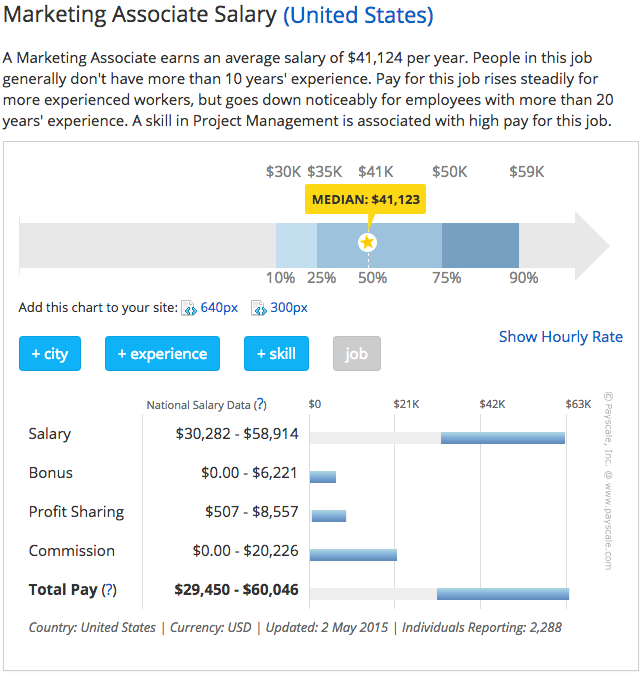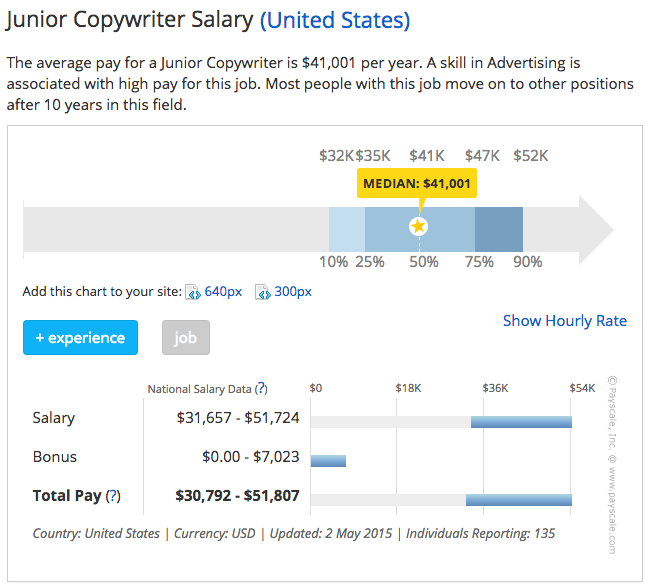The hunt for your first job out of college is an emotional rollercoaster. You might feel a mixture of excitement to be graduating (not to mention earning a paycheck!), confusion about exactly what you want to do with your life, stress about the sudden onslaught of crucial life decisions you have to make and zeal (or possibly terror) about your new status as a legitimate grown-up. It’s a lot to deal with. But if you root every step of your job search in data, you can alleviate uncertainties and set yourself up for a lifetime of higher earning power. Let PayScale’s data be the north star of your career research!
Step 1: Research Job Titles
Even if you know what kind of job you want, knowing which jobs to apply to can be overwhelming. Say you are about to graduate with your trusty Communications degree, and you’ve decided that you want to work in the advertising industry and do something that involves writing. So turn to your favorite job search resource and start searching for those terms!
Unfortunately, when you start searching “content” or “marketing” into your trusty job search board, you see a dizzying variety of job titles, ranging from Junior Copywriter to Marketing Associate to Online Community Manager, just to name a few.
Your actual job title will affect more than how spiffy your first business card looks. Job titles affect pay, the type of work you end up doing every day and the overall direction of your entire career path. Yes, that’s a lot of pressure. But before you go into an existential crisis, let me share a little secret with you: PayScale has all the tools you need to determine which job titles are best for you.
Step 2: Learn How Job Titles Affect Pay
PayScale’s Research Center has salary data for over 14,000 job titles. With just a few clicks of a mouse (or taps on a tablet) you can find out that Junior Copywriters and Marketing Associates earn a national median salary of around $41,000, but Online Community Managers earn $51,000. That’s a big difference right out of school!
But our Research Center doesn’t just show you salaries. It also tells you what skills have the biggest impact on different titles so that you can target your job search to your strengths. You can also see how pay varies depending on where you live, or how much experience you have. Suddenly that overwhelming list of job titles feels much more manageable.
Step 3: Think Long Term
You won’t be in the same job forever, but your first job will have a big influence on your subsequent jobs. Sure, you can always change careers (and it’s more common to do that today than ever before), but some job titles naturally lead to others more often – and once again, PayScale has the data to help you figure that out. We even package it up in a nifty tool called the Career Path Explorer.
With the Career Path Explorer, you can enter in one job title and we’ll tell you what jobs people with that title typically hold five years later. If we return to the list of jobs in the previous example, we see that Junior Copywriters typically become Copywriters, Senior Copywriters or Associate Creative Directors. Online Community Managers typically become Social Media Managers or Social Media Strategists. And even though you’ll probably make less as a Junior Copywriter, if you use that as a stepping stone to work your way toward Associate Creative Director, you’ll earn more than you will following the social media path.
Step 4: Determine Your Worth In a Role
Now that you’ve figured out what job titles you want to target, applied for them and (hopefully) gotten a few interviews lined up, it’s time to figure out how much you specifically should earn in these roles. After all, the golden rule of salary negotiation is to have a specific, well-researched number in your pocket before you ever start talking about salary.
The Research Center gave you a good starting point, but to know exactly how much you should be asking for, you have to take the PayScale Salary Survey. Choose the option that says “I am researching a job that is not my own,” spend 10 minutes answering questions about the job and your background, and our magical data elves* will tell you how much you should be earning in that job, working for that company and working where you do.
See how powerful a little data can be when it comes to navigating your first job search?
*PayScale is not actually powered by magical data elves. PayScale is actually powered by powerful algorithms and an incredibly smart data science team.



Leave a Reply